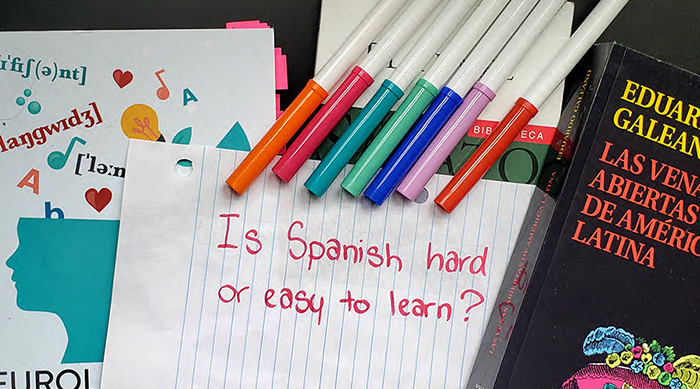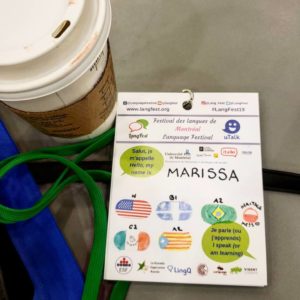How Difficult To Learn Argentine Spanish

With the growing apply of Spanish in the US and Canada, more than and more English speakers take begun to ask themselves: is Spanish easy to learn? Or is Spanish hard to acquire?
The deciding factor for if Spanish is difficult or easy to learn may exist with you lot–the learner–more than with the language itself.
Merely if you're considering beginning to learn Castilian (or relearn it), nosotros have a great quiz for how long does it take to speak Spanish.
By the end of this commodity, you'll know (i) more nigh what external factors make Spanish hard or easy to larn (2) what you lot can do to make Spanish easier to learn for yourself and (iii) what makes Spanish as a language a bit easier than other types of languages.
I'll illustrate it with tons of interesting examples, and you'll learn a bunch nigh languages.
Allow'southward dive into Spanish grammer, vocabulary, tools, mutual problems, and more!
This article is part of a larger series called French vs Spanish. Click the championship to see the main article, or click here to see all French vs Castilian articles.
Why Spanish might seem hard to learn

I failed out of loftier schoolhouse Spanish, now I larn languages (and blog virtually them) as a hobby. Let's investigate if learning Spanish is hard together.
Starting a language tin seem similar a daunting project, especially if you lot alive in a monolingual bubble.
(If yous're new to languages, the term monolingual refers to one (mono) tongued (lingual). And if you've lived surrounded entirely by English language your whole life, a new linguistic communication might seem similar some other world.)
Then let'southward wait at why some people might exist wondering if Castilian is hard to learn.
Past failures
English speaking school systems are notoriously known for producing monolingual children despite years of language preparation.
- In the U.s.a., only 20% of Americans ever study a new language. And there are no statistics on how many of that xx% can actually communicate the language they written report.
- Despite the British Isles existence the home of 7 home-grown languages, (not even counting Manx or the three recognized sign languages), 62% of British citizens only speak English.
- And Australia? 73% of the nation speaks only English language at home. 250 indigenous languages are believed to have existed when Europeans first conquered the isle.
- In legally bilingual Canada, only 24% of Canadians can speak both of the country's national languages despite all Canadians having to have English language and French in public schools.
This must be because languages are super hard right?
So is Spanish hard to learn and we should just surrender reading hither?
Non at all.
- In the island nation of Republic of malta, on peak of their ain Maltese language, 88% of the population speak English, another 66% Italian, and 17% can speak French. Their public schools also offer Arabic, German, Russian, and Castilian equally additional languages.
- Switzerland has iv federal languages (French, German language, Italian, and Romansh). 64% of Swiss citizens say they apply more than than one language on a weekly basis, 38% use ii or more languages in one case a week, nineteen% apply three or more than, and 7% say they apply 4 or more languages every week. [source]
- And countries like Deutschland, Poland, or France that but recognize one linguistic communication as their national linguistic communication? (Even if many more than are spoken there?) Equally far as English goes, 56% of Germans, 34% of Poles, and 39% of the French say they can agree a chat in English. (Which, of grade, doesn't count how many of them may also speak Italian, Russian, or whatever other language.)
So what does this accept to practise with Spanish being difficult or easy to larn?
Let's be clear:
If you failed to acquire Spanish, French, or whatsoever language in school, it's not your mistake.
You're not bad at languages. Y'all're not stupid.
Information technology was your school.
So what'due south the departure between English language-speaking schools and those in countries like Malta or Switzerland?
Well, it's more than merely schools.
Monolingual societies
For citizens who live in societies where simply one language is promoted (even if many others are spoken there), learning a second linguistic communication can be hard.
Simply it's not the difficulty of having a second linguistic communication.
Information technology'south the civilisation they're living in.
So why is that?
Languages are undervalued
 How could a country'south opinions about languages bear uponyour personal ability to study Spanish? Allow's look.
How could a country'south opinions about languages bear uponyour personal ability to study Spanish? Allow's look.
First, a question. How many Americans remember French is a beautiful linguistic communication? With 76 million speakers, the language of honey has been long dearest by Americans, even right down to their accents. There are even entire books about why Americans love France and all things French.
And our college language choices are a reflection of that. 198,000 college students were enrolled in French courses in 2016.
"But that makes sense!" cries the reader. "We don't hate languages at all!"
Well, it's a bit more complicated than that.
What do Americans think about Bengali?
Recall for a moment: how many speakers do you think Bengali has?
Practise you know where information technology'south spoken?
Is it a country, a city, a region, or what?
And what do you think virtually information technology when you hear the name?
Bengali has 230 million native speakers–about three times the number of native French speakers. Bangladesh is one of the top 30 largest economies of the world, and has the EIGTH largest population in the world at 168 million people! (France itself has only 67 million people.)
But 7 students through the US were studying Bengali that same year that 198,000 were studying French.
The languages we learn or don't larn are based entirely on what our society thinks about those languages.
And if pop perception changes which languages we learn… tin information technology bear on our attitudes about language learning as well?
Could it fifty-fifty touch on if nosotros perceive languages every bit hard or easy to learn?
Allow's go into how social attitudes directly affect language classrooms.
Language education is underfunded
In a nutshell, pop attitudes can quickly turn into economic and educational disasters.
81% of Americans in a 2016 Pew report reported that speaking English was "very of import", but merely 36% idea learning a "strange language" was "important".
So what else was happening the aforementioned year?
Between 2013-2016, 651 language programs were cut across the US according to the Modern Languages Association of the Us. Even America's favorite language, French, wasn't spared. It lost 129 programs in the blow.
Does all this mean that a language is hard to learn if yous live in an English-speaking country?
Well, the odds are certainly stacked against you in school.
Just information technology doesn't just end there.
Fewer language learners = fewer language resource
Allow's become back to the example of the country of Republic of malta, where the overwhelming bulk of its citizens are bilingual or multilingual.
Malta has 2 official languages, Maltese and English, and previously had Italian equally an official linguistic communication.
How does this factor into the Maltese people becoming well-known for their multilingualism?
- Simply 82.41% of the population regularly listens to Maltese radio. 25.41% listens to Italian and a smaller 14.69% listens to English radio. [Source]
- Local TV in Malta in bilingual between Maltese and English. [Source]
- There are equal numbers of national newspapers in Maltese and English. [Source]
- three% of Maltese prefer to read books in Italian than in other languages, and half dozen% said that about Italian language magazines. [Source]
Now can you imagine all TV channels, major newspapers, and radio stations suddenly turning bilingual in English speaking countries?
Probably not.
Picayune language learning creates fiddling need for linguistic communication exposure, which in turn creates piddling linguistic communication learning and well… you get the picture show.
So now permit's commencement applying this all to if Spanish is hard or like shooting fish in a barrel to acquire.
Citizens of multilingual countries are constantly surrounded past other languages.
So let'south epitomize the differences between monolingual countries and multilingual countries:
- Multilingual countries have better funding for public language programs
- Multilingual countries create "at home immersion" environments for their citizens
- Multilingual countries take more multilingual people to speak various languages with
- Multilingual countries experience less violence or stigma towards bilingual people
And then does that mean if you lot're in a monolingual country, learning a 2d linguistic communication is impossibly hard?
Not at all.
Information technology merely means there are a lot of large, powerful, and rich forces trying to scare you abroad from learning Castilian.
Only that shouldn't scare you at all.
There are plenty of polyglots and multilingual people who have put a ton of amazing language learning resources online, or who take created blogs similar this ane to assist you out.
By the stop of this commodity, you'll have a meliorate path forrard for learning Spanish and sympathize what you lot can do to make it easier to acquire.
At present that we've gone through why Spanish might seem difficult to learn, allow'south await at the Spanish language itself and talk about your private state of affairs.
Is Spanish vocabulary difficult to learn?
What makes a word hard to acquire?
Well, learning words from our own native languages can be easy. Allow's look at some vocabulary you've learned by accident in your life:
- If you're over 30, recollect about how quickly you added Googling equally a verb or to your ain lexicon–probably without even thinking about it. You didn't even know what a Google was in 1996!
- And if you're under xxx, think about all of the words you've learned or fabricated up as y'all've gone forth with life. You've gone from 2008 rawr =^.^= to 2013dead / aforementioned / me 2019 fucking mint and who knows what past the time you lot've read this article.
And y'all didn't even realize you were learning information technology!
But vocabulary in a different language?
Doesn't that seem hard to larn?
Exploring English
First, let's await at the language we already speak if you're reading this: English language.
English is a kleptomaniac language. It sees a discussion and takes it and screams "mine now!"
English is ane of the very many Germanic languages. This ways that English shared a common "aboriginal linguistic communication" German, Swedish, Danish, Western frisian, and almost 45 other languages. Nosotros don't know what information technology sounded like, simply nosotros do know some cool things virtually what these languages have in mutual:
- We like to stress the first syllable in words. While that might not sound spectacular if yous simply speak English, consider the give-and-take PAR-la-ment over the globe par-la-MEN-to in Spanish. (Languages similar Spanish with are derived from Latin like to stress the second-to-last syllable.)
- Boom words together to brand a new discussion! The stool you lot use at a bar? Barstool. The friend you live with? Roommate. Might not sound heady, but consider the Spanish discussion for roommate: "el compañero de cuarto" or "the friend of the room". And barstool? Just a regularbanca, aka "stool" all by itself.
- We share a lot of words, just they may look a bit different.The German mein Bruder is basically the twin of the English "my blood brother". The blouse? Die Bluse. To say? Sagen. Hither's an awesome listing if you really want to fall deeper down the language rabbit hole.
So how does that help u.s.a. with our large question: is Spanish hard to acquire?
Because throughout its history, English language kept taking words from other languages.
When the Romans came in around 100CD, they brought in their big fancy Latin linguistic communication. And they merely had words the Celts (who were then living in English) could utilise!
Dictator, forum, circus, curator, decimate…. they're absolutely cool words and were hand-delivered from Latin.
Have yous ever crossed the route at apex? Yup, you know some pretty solid Latin then.
But and then about a thousand years later, the French strut in and bring in their absolutely fabulous culinary vocabulary with them. And French is also a Latin-based linguistic communication!
Accept yous always cooked a good dish in a friend's kitchen, wondering if the pasta sauce needs more butter, cheese, orwine? And your friend is a vegetarian, which is fine because you don't like pork anyway, just y'all wish there was somebeefiness on the side? Then you lot might know some more than French than you realize.
And gauge which other language is a Latin linguistic communication?
Yup: Castilian!
The English language-Spanish connection

The roots of words contemporary English vocabulary. [Source: Wikipedia]
In fact, over half of the words in English can be traced to Latin, either considering of the Romans or the French.
So how much vocabulary do English and Spanish accept in common?
About 30-twoscore%.
That'due south because Spanish evolved straight from Latin.
So at the same time that Latin was influencing English language up n, down southward on the Iberian Penninsula, those aforementioned words were being used.
Eventually, those two places changed Latin beyond recognition. Just, like cousins, you can run across a distinct family resemblance between many English and Spanish words.
Allow's look at what that means in practical language learning and really start to finally reply our questionis Spanish hard to larn.
What makes a word easy to learn
When we learn a new give-and-take or phrase in English, nosotros take a "hook" to hang it on.
Let me bear witness you what I hateful by taking the 2020 slang "the blueprint".
If today you saw a photograph of a celebrity from 2009, let'due south say someone beloved like Beyoncé, wearing a great outfit. The caption said "ugh, she really was the blueprint" what would you assume?
Well, that whatsoever this glory was doing in the photo was good. Probably that her fashion in that 2009 photo was a model for today's mode goals.
You can guess that considering you know what a pattern is.
Y'all could probably fifty-fifty employ the phrase "she really was the blueprint" immediately after hearing information technology, and apply it correctly.
Even the word blueprint would be like shooting fish in a barrel for a kid to learn if they had never heard it before.
Let's pretend at 7 years old you see a photo of some construction worker property a map-type-object, and someone says "he has a design."
You lot know the word blue, and you lot know about printing. And thenblueprint isn't a stretch.
All of these words in English are piece of cake because nosotros have a neurological "hook" to hang it on.
And so let's try this quiz and run into if you (as an English language speaker) have hooks to hang your new Spanish vocabulary on.
- El problema
- La situación
- La música
So far then good right? The problem, the situation, and the music.
Permit'south attempt a few more:
- La libraria
- El té
- El jugo
Maybe a flake harder, simply nonetheless not much of a stretch.La libraria isn't "the library" but rather "the bookstore" or "the bookshelf." Not besides far off though.
El téis "the tea" andel jugo is "the juice". You can come across the connection though, right?
Let's endeavor these harder ones:
- El teclado
- La pluma
- El fantasma
It's a bit more of a stretch here.
El teclado is "the keyboard". But you lot can build your own hook by thinking "well, tec is like tech, lado is like loud, so information technology'southward the tech matter that's loud when you touch it."
La pluma means "the plume", like to the English language "plumage" of feathers. And in my Mexican Spanish, nosotros utilizela pluma to hateful "the pen". I judge you lot can recollect how that happened right?
And finally,el fantasma is "the ghost." At this point, you can make your ain claw to remember that with.
Certainly, some words volition be hard to build hooks for: la sandía (the watermelon), el vidrio (the glass), or la iglesia (the church) are all a bit harder.
So is the vocabulary of Spanish hard to acquire?
If you're an English speaker, information technology shouldn't exist.
Sure, you'll need to couple it with good vocabulary study habits and a adept plan.
Only mainly you'll need a chip of patience and a bunch of practice.
Is Spanish grammar hard to learn?
So nosotros've decided that Castilian vocabulary probably isn't that hard to learn.
Simply what about the other big half of linguistic communication construction?
What even is grammer?
Grammar definitions are and so featherbrained merely a linguist could understand virtually of them.
I invite yous to cheque out the horrifying explanation by Oxford:
Grammer – /ˈɡramər//ˈɡræmər/
NOUN – The whole organization and structure of a language or of languages in general, ordinarily taken equally consisting of syntax and morphology (including inflections) and sometimes also phonology and semantics.
Alibi me, Oxford? Let's attempt simplifying that down so we can all sympathize it.
How a linguistic communication is put together. The system of all its pieces–words, the lodge of words, the sounds, and all it'south meanings.
If words are ingredients, grammar is the chef that puts them together.
If words are books, like footling packages of cognition, grammar is the librarian that keeps them orderly.
So what makes grammar difficult or easy?
When you learn grammer, it'due south like uncoding a huge and complex puzzle.
It can be difficult and frustrating, but information technology tin can as well be a very absurd way to await at the globe.
In my experience, there are a few things that make language's grammer difficult to acquire for the adult learner.
How different it is from the grammar in the adult's native language.
Here we become again!
Merely like with vocabulary, if a linguistic communication has grammer similar to the grammer of your native language, it'll be a lot easier to learn.
For example, in English language we might say "I am going to eat".
In Spanish? Voy (I go) a (to) dormir (sleep). Basically identical.
But in Catalan, if you say (word for word) vaig (I go) a (to) dormir(slumber) you're proverb "I slept" in the By tense.
And so in that style, Spanish grammer might exist easy to learn!
But of course, sometimes Castilian has it's ain way of proverb things.
English's "I don't accept any" turns into no tengo ningún("I don't have none") and "I would've tried to become" into me hauria gustado ir ("it would have been pleased me to get").
Plus, there are genders.
Merely like in English language we have she, he, or the neutral they to describe a person, in Spanish those gender markings tin also exist practical to objects. The tabular array is feminine, the book is masculine… and and then on for every object. (Don't worry, y'all'll empathize improve once you start learning.)
Simply in general, Spanish isn't totally conflicting to English'southward grammer.
How many or few sounds there are makes a language easier or harder for some speakers.
Depending on where you're from and how you lot speak English, nosotros have about 20 vowel sounds. That's why the U in cut and put sound different, simply A and O about and octopus sound the same in many versions of English.
It's fifty-fifty crazier when you lot consider that in the south of the US pen and pivot are pronounced the same way, and in my North-Eastern corner, they're very different sounds.
But Spanish?
Five vowel sounds. A, E, I, O, U.
And they sound identical every time.
And Spanish has about equally many consonants sounds equally English does.
At that place are simply two new sounds you lot'll have to larn in Castilian:
- ll (which is kind of similar the y in "yes")
- ñ (which is kind of similar the n in "trip the light fantastic")
Just Spanish has an absurdly easy sound organisation for English speakers.
How many moving parts at that place are effects if a linguistic communication is easy or hard to acquire.
What do I mean by moving parts?
Let'due south requite an case in English.
In English, when we make something into a plural, nosotros often add and -s to the end.
This is helpful considering it helps us explain if nosotros're talking nearly someone'south favorite band and nosotros desire to explicate "I love their recent album" singular verses "I dear their recent albums" plural.
So that plural -s is ane "moving part" in English.
Hither are some more:
- We have a banana but an apple makes it sound nicer.
- His dog and her dog, and their dog all mean virtually the aforementioned affair.
- I walk, yous walk, simply he walks and nosotros all walked yesterday.
This is one of the reasons Chinese linguistic communication lovers say their linguistic communication is so piece of cake to larn. There are very few moving parts.
Spanish on the other hand?
- La casa es blanc a pero el edificio es negr o . The house is white, but the home is black.
There are two possible "the" words in Spanish: el and la.
And the last letter of some adjectives might be an o or a, depending on what that adjective refers to.
- Yo camino y tu caminas. I walk and you walk, but "to walk" needs to change depending on who does it.
Let's just say that this isn't one in favor of Spanish'south ease of learning.
How many special structures there are changes how piece of cake or difficult a language is to learn.
To make a argument in English it's: "you like to eat."
But to make that statement into question, we need to change the structure a fleck.
"Practice you like to consume?" or "why do y'all like to swallow?"
We only add together a little indicator discussion, raise our vocalism at the terminate, and nosotros're ready to go.
Castilian is basically identical, if not easier.
Quieres comer (you want to swallow.) turns into ¿Quieres comer? (do you lot want to eat?) without calculation whatever additional give-and-take!
1 more point in favor of Castilian being an easy language to learn.
How many exceptions there are might make a linguistic communication harder or easier to learn.
So nosotros've already gone over how we add together an -s onto things to make them plural in English right?
Well, even children tin can tell you that p eople take invented plenty of exceptions to this rule. That's why two gooses is two geese only two mooses isn't 2 meece.
And it just doesn't stop there! We add -ed to many ending: walked, cooked, opened. Merely we don't runned, eated, or drinked.
Every language has its own rules and plenty of its own exceptions.
And while I, unfortunately, can't notice whatever comparative English/Spanish information, my own experience as someone who has learned multiple languages is that Spanish has relatively few in dissimilarity with wacky English.
Is Castilian hard to acquire, as far as grammar goes?
Not with a skillful teacher, information technology shouldn't exist.
Just what about with bad methods or a bad instructor?
I of the many problems with Duolingo and other fun apps is that you don't go real explanations for these things. They only try to drill information technology into your head through repeated exposure to the same 2500 or so words.
Only it's certainly much easier to learn any language with a good teacher who can first teach you the rules and and so gets you practicing how to use Spanish grammer with fun activities.
Then no, Spanish grammar shouldn't be very difficult to learn.
Why languages are easy to forget
And then you probably are starting to experience like my conclusion is that Spanish is easy to learn, right?
There'south 1 more matter nosotros take to talk most though:
What happens after you learn Castilian? Is Spanish piece of cake to forget?
Well, here's a quote that I once heard from my exasperated my Catalan teacher: "Languages are so easy to larn, and and then difficult to maintain."
That'south because once you put in all sorts of effort into learning Spanish, there's withal a ways to go.
You'll accept to maintain it.
Let's look at why languages are and so hard to maintain actually chop-chop, so that fashion if you set off to learn Spanish after this commodity you lot don't find yourself frustrated in two years.
And if you're looking to relearn Spanish because you've forgotten what yous've learned from friends or family unit you'll know what I mean.
The complication of languages tin make Spanish easy to forget
Consider the sentence: "I take to go to our house."
Simple. Like shooting fish in a barrel.
Sounds like it came from a 4-yr-one-time.
But under a microscope?
Or in Spanish?
I have to go to our house. Tengo que ir a nuestra casa.
- I have / Tengo = Nosotros demand to know the word for "to take", aka "tener". Then we need to make sure it fits right: I have (verses "he has") and in Spanish the even more dramatic "tener" becomes "tengo" (I accept, verses "he has",tiene).
- have to / tengo que = in English we take a job where nosotros taketo work. One is possession, one is responsibility. We just drop a little "to" in for English, and a little "que" for Spanish.
- to get / ir = we just need to know the word here, nice and easy.
- our / nuestra = should look uncomplicated enough, only in Spanish "our" has to be in agreement with "house" (casa) just like in English her cat or his true cat has to be in agreement with the possessor'due south gender.
- house / casa = you just need to know the word right? Well, in Spanish, its grammatical gender is of import also and will change basic words similar "the", "a", or "ours". (But y'all'll become used to it soon enough.)
That's a lot of individual pieces of cognition just to produce one sentence!!
So what does this have to do with forgetting a language?
If y'all forget just one of those many parts, the whole sentence breaks downwardly.
But in cooking, yous can forget a spice and normally get by okay.
And in art, you can skip a step and call it your own personal fashion.
But in languages? Every part is essential to the whole.
And then you need to know, and remember, every part.
I have some other example betwixt French and English language in my article How to Relearn A Langauge.
Merely the point is clear: there's a lot of stuff going on, no matter how unproblematic the sentence is.
Monolingual societies, take 2
Like we went over to a higher place: as English speakers, we but don't live in a social club that priorities multilingualism.
Other countries accept multiple national languages, where schools are mandated to instruct in multiple languages or perchance the students even go to pick their language of instruction.
Those same countries besides will take bilingual news channels or services offered in all 4 national languages.
Even in many countries with only one national language like Poland, you'll see the heavy presence of English media (English being a foreign language to them) likewise as linguistic influence from their neighboring countries.
Simply put: it is much easier for them to integrate boosted languages into their everyday lives than information technology is for people in English speaking countries.
Then you know how we went over how languages are hard to learn in monolingual societies?
They're likewise hard to maintain in monolingual societies.
And so later yous determine if Spanish is easy to larn or not, y'all'll also demand to consider maintaining the language. Maintaining information technology will require additional work and patience far after the agile "learning process".

I failed out of high school Spanish. 11 years after, this was my name tag at Langfest 2019 with the languages I could speak at that time.
Then is Spanish difficult to learn?
I used to call back Castilian would be hard to acquire.
When I first picked up Duolingo myself in the winter of 2017, I idea it would have me years to even have a conversation. Simply I would do information technology with hard work and conclusion.
And I hadproof that information technology was hard!
I had failed out of Spanish form in high school.
I had forgotten my own native linguistic communication.
I didn't know anyone who had learned a language successfully every bit an developed.
So surely, Spanish must not only be hard but all languages must be hard.
Well, I don't call up then anymore.
As with all new skills, it tin can feel daunting and overwhelming at first. Information technology tin can exist a struggle. Learning and growing tin accept a lot of hard piece of work and a ton of patience.
Only ultimately–and peculiarly for English speakers–Spanish doesn't have to exist difficult to acquire.
Notice yourself some expert language resources. Discover yourself a good teacher. Experiment with what works or doesn't for you.
And don't give upward.
If yous want to know anything else about if Spanish is hard or easy to larn, leave them in the comments and then I can help clarify annihilation you need!
How Difficult To Learn Argentine Spanish,
Source: https://relearnalanguage.com/is-spanish-hard-to-learn/
Posted by: myerstoop1998.blogspot.com



0 Response to "How Difficult To Learn Argentine Spanish"
Post a Comment